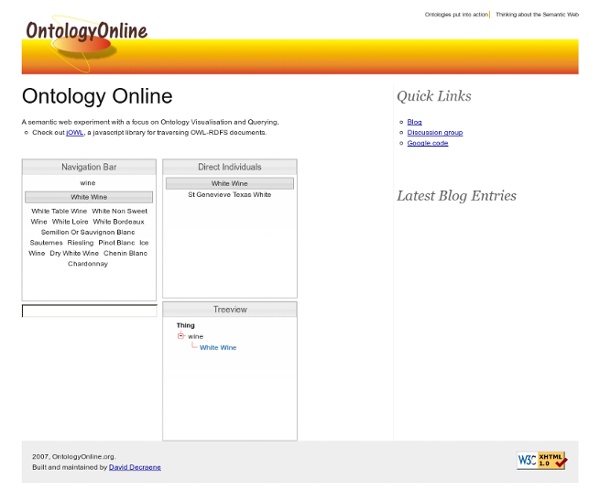



UMBEL Web Services (hosted by Structured Dynamics) UMBEL Web services are supported by the structWSF Web services framework. The latest version of the UMBEL ontology has been indexed by the structWSF instance, and gets exposed to the generic public through these services. This structWSF-UMBEL instance is made public for testing purposes only. If you want to develop commercial applications around it, you will have to install structWSF and import UMBEL into your own instance since the performances and the up-time of this demo instance is not guaranteed. All of the tools on this Web site are using one, or multiple, of these structWSF endpoints: Access Information Here is the summary information you need to know in order to be able to query the latest version of the UMBEL ontology using the structWSF Web services endpoints. The permissions of the guest users are: Create: FalseRead: TrueUpdate: FalseDelete: False These settings mean that only the Web service endpoints that require Read permissions will be accessible to you. POST, orGET
Knoodl Ontology Tools - OSF Wiki This listing received its last major update on Aug 22, 2010 (though with minor additions since). All tools added at that time are marked with <New> (new only means newly discovered; some had yet to be discovered in prior listings). There are now a total of 185 tools in the listing, 31 of which are new, and 45 from the first release. <Newest> reflects updates — most from the developers themselves — since the original publication of this post. Comprehensive Ontology Tools Altova SemanticWorks is a visual RDF and OWL editor that auto-generates RDF/XML or nTriples based on visual ontology design. Not Apparently in Active Use Adaptiva is a user-centred ontology building environment, based on using multiple strategies to construct an ontology, minimising user input by using adaptive information extraction Exteca is an ontology-based technology written in Java for high-quality knowledge management and document categorisation, including entity extraction. Vocabulary Prompting Tools
Terminologies Service Multiple thesauri in a single interface The Terminologies Service provides access to multiple controlled vocabularies to help you create consistent metadata for your library, museum, or archive collections. Now it's as easy as copy-and-paste into a workform or template once you find a term to use in your description, improving the description of (and access to) your digital and hard copy materials. The vocabularies As the Service grows, so will the number of available vocabularies. Getting started If you already have a Connexion or other OCLC cataloging authorization, you may begin using the Terminologies Service immediately. Get started now
About WordNet - WordNet - About WordNet WordNet is supported by the National Science Foundation under Grant Number 0855157. Any opinions, findings, and conclusions or recommendations expressed in this material are those of the creators of WordNet and do not necessarily reflect the views of the National Science Foundation. About WordNet WordNet® is a large lexical database of English. Nouns, verbs, adjectives and adverbs are grouped into sets of cognitive synonyms (synsets), each expressing a distinct concept. WordNet superficially resembles a thesaurus, in that it groups words together based on their meanings. Structure The main relation among words in WordNet is synonymy, as between the words shut and close or car and automobile. Relations The most frequently encoded relation among synsets is the super-subordinate relation (also called hyperonymy, hyponymy or ISA relation). Meronymy, the part-whole relation holds between synsets like {chair} and {back, backrest}, {seat} and {leg}. Adjectives are organized in terms of antonymy.
RiTa now with one API for Java, JavaScript, Node, & Android! RiTa† is designed to be an easy-to-use toolkit for experiments in natural language and generative literature. The philosophy behind the API is to be as simple and intuitive as possible, while still providing adequate flexibility for more advanced tasks. RiTa is implemented in Java and JavaScript with a single API and optionally integrates with Processing. It is free/libre and open-source via a GPL license. Some of the features of RiTa/RiTaJS include: Text-generation via Context-Free Grammars and Markov-chainsTaggers for Syllables, Phonemes, Stress, Part-of-Speech, etc. Based on the RiTa library for Java, RiTaJS was developed to provide a seamless transition for those wishing to work with programmatic natural language natively in the web browser (in HTML5), as well as for those switching from Processing to ProcessingJS. † from the old Norse, meaning to mark, scratch, or scribble
The Linking Open Data cloud diagram